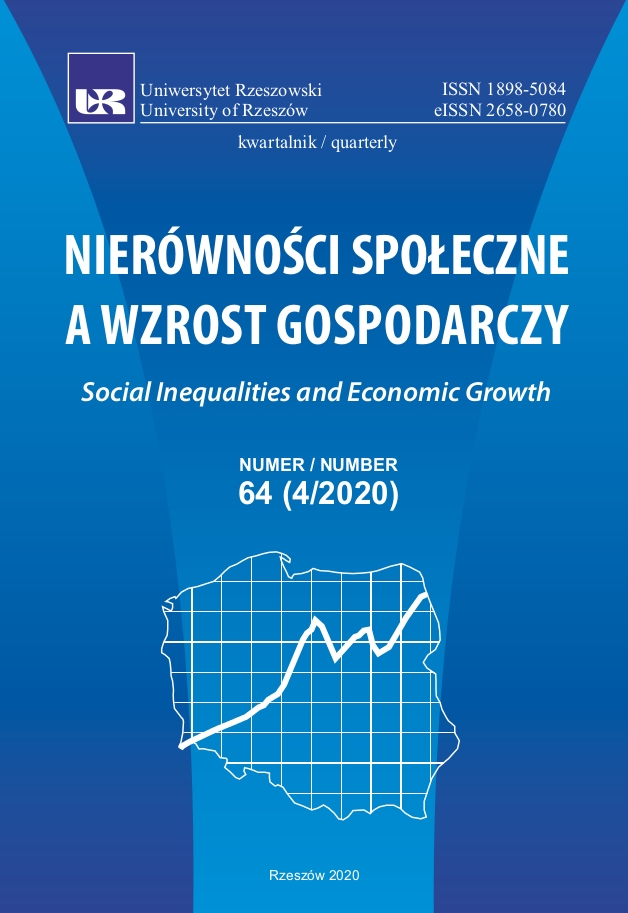Evolution and role of the concept of content in an informationand knowledge-based society
DOI:
https://doi.org/10.15584/nsawg.2020.4.7Keywords:
content management, intelligent content, DIKW model, Enterprise Content Management (ECM)Abstract
In today’s information society and knowledge based economy one of the main development factors is the use of electronic forms of creating and conveying information. However, there is a terminological and management problem with the volume of the processed information as well as the increasing number and variety of forms of presenting and conveying the information. In the last few years the fields of socio-economic sciences as well as technical and engineering studies have encompassed a new keyword – “content”, which in the Polish terminology is usually translated as “treść”. The language of economy, management and IT have lastingly embraced such terms as Content Management, Enterprise Content Management, Content Marketing or the most recent ones – Social Content or Content Governance. Content is an abstract and multi-meaning term whose use, despite its huge popularity, leads to many ambiguities and causes many interpretation problems. The first research question posed in this paper is – for how long has the term content been functioning in our environment? The paper presents the evolution of electronic information forms processed in IT systems for several decades now. The paper offers a broad definition of the term content as well as its most recent form –intelligent content. The second research problem presented in the paper involve the relations between the term content and the classic hierarchical concept – i.e. the Data–Information–Knowledge–Wisdom model (DIKW). The first conclusion is the statement that content is a category that encompasses the following processed in electronic form: data, information and the part of knowledge that can be formalized and recorded, i.e. explicit knowledge. The second conclusion from analyzing the functions played by content in the process of the organizational creation of knowledge is that content is the most important strategic medium in knowledge management within an information and knowledge based society.
Downloads
References
Ackoff, R. (1989). From data to wisdom. Journal of Applied Systems Analysis,16, 3–9.
Adam, A. (2008). Implementing Electronic Document and Record Management Systems. Boca Raton: Auerbach Publications.
AIIM. (2014). What is Enterprise Content Management (ECM)? Pobrane z: http://www. aiim. org/what-is-ecm-enterprise-content-management (2019.05.05).
Baskarada, S., Koronios, A. (2013). Data, Information, Knowledge, Wisdom (DIKW): A Semiotic Theoretical and Empirical Exploration of the Hierarchy and its Quality Dimension. Australasian Journal of Information Systems, 18(1), 5–24. DOI: 10.3127/ ajis.v18i1.748.
Birkenmajer, A., Kocowski, B., Trzynadlowski, J. (1971). Encyklopedia wiedzy o książce. Wrocław, Warszawa, Kraków: Zakład Narodowy im. Ossolińskich.
Boulding, K. (1955). Notes on the information concept. Explorations (Toronto), 6, 103–112.
Braak van de, P. (2001). Prime time for Content Management. e-doc, July/August, 49–53.
Cambridge Dictionary. (2019). Cambridge Dictionary on-line (wyszukiwane fraza – content). Pobrano z: https://dictionary.cambridge.org (2019.08.10).
Casey, M. (2001). Europejska polityka informacyjna. Wyzwania i perspektywy dla administracji. Toruń: Międzynarodowe Centrum Zarządzania Informacją.
Choo, C. W. (2006). The Knowing Organization: How Organisations Use Information to Construct Meaning, Create. Oxford: OUP.
Clark, D. (2014). Rhetorical Challenges and Concerns in Enterprise Content Management. W: J. vom Brocke, A. Simons (red.), Enterprise Content Management in Information Systems Research. Berlin Heidelberg: Springer-Verlag.
Ćwiklicki, M. (2003). Koncepcja zarządzania zasobami informacyjnymi w przedsiębiorstwie. Zeszyty Naukowe Akademii Ekonomicznej w Krakowie, 6, 71–86.
Henry, N. (1974). Knowledge Management: A New Concern for Public Administration. Public Administration Review, 34(3), 189–196. DOI: 10.2307/974902.
Mega, C., Wagner, F., Mitschang, B. (2005). From Content Management to Enterprise Content Management. Datenbanksysteme in Business, Technologie und Web, 11. Fachtagung des GI-Fachbereichs "Datenbanken und Informationssysteme" (DBIS), 2–4 März 2005. Karlsruhe. Pobrane z: https://dblp.uni-trier.de/db/conf/btw/btw2005. html. (2019.08.10).
Nonaka, I., Takeuchi, H. (1995). The Knowledge-Creating Company: How Japanese Companies Create the Dynamics of Innovation. New York: Oxford University Press.
Nonaka, I., Takeuchi, H. (2000). Kreowanie wiedzy w organizacji. Jak spółki japońskie dynamizują procesy innowacyjne. Warszawa: Poltext.
Oxford Advanced Learner’s Dictionary. (2019). Oxford Advanced Learner’s Dictionary (wyszukiwane fraza – document). Pobrane z: https://www.oxfordlearnersdictionaries. com/definition/english/document_1?q=document (2019.08.10).
Oxford Advanced Learner’s Dictionary. (2019). Oxford Advanced Learner’s Dictionary on-line (wyszukiwana fraza content). Pobrane z: https://www.oxfordlearnersdictio¬naries.com/definition/english/content1?q=content (2019.08.10).
Piech, K. (2004). Gospodarka oparta na wiedzy jako etap przemian społeczno-gospodarczych krajów transformacji systemowej. W: A. Skowronek-Mielczarek, J. Nowakowski (red.), Gospodarka, przedsiębiorstwo i konsument a wyzwania europejskie (s. 180–186). Warszawa: SGH.
Polanyi, M. (1966). The Tacit Dimension. Chicago: The Univesity of Chicago Press.
Rockley, A., Cooper, C. (2012). Managing Enterprise Content. A Unified Content Strategy. Second Edition. Berkeley: New Riders.
Rowley, J. (2007). The wisdom hierarchy: representations of the DIKW hierarchy. Journal of Information Science, 33(2), 163–180. DOI: 10.1177/0165551506070706.
Skrzypek, E. (2011). Gospodarka oparta na wiedzy i jej wyznaczniki. Nierówności Społeczne a Wzrost Gospodarczy, 23, 270–285.
Trąbka, J. (2013). Enterprise Content Management Platforms: Concept Update, Role in Organization and Main Technologies. W: M. Pańkowska, J. Palonka, H. Sroka (red.), Ambient Technology and Creativity Support Systems (s. 192–205). Katowice: Uniwerystet Ekonomiczny w Katowicach.
Trąbka, J. (2017). A proposal for an ECM systems modeling method – defining tactical perspective – lesson learnt from a case study. W: S. Wrycza, J. Maślankowski (red.), Information Systems:Research, Development, Applications, Education (s. 136–151). Berlin: Springer.
Ulrich, K. (2006). ECM.Enterprise Content Management. Hamburg: Project Consulting.
Zimmer, M. (2001). Enterprise Content Management is a Key Success Factor for an e-Business Infrastructure. KMWorld, maj, 5–6.
Downloads
Published
How to Cite
Issue
Section
License
Copyright (c) 2020 University of Rzeszow

This work is licensed under a Creative Commons Attribution-ShareAlike 4.0 International License.


